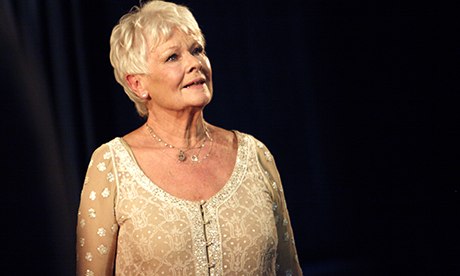
I count myself fortunate to have been part of the audience at Saturday night's celebration of the National theatre's 50th birthday. I don't know how it looked to viewers on BBC 2 or in cinemas at home and abroad. But, sitting in the Olivier, what we got was a brilliant kaleidoscopic entertainment that not only evoked the National's past but also, through astute recasting, opened up possibilities for the future.
Obviously it was moving to see legendary actors, either through archival footage or live performance, repeating past successes. There was a white-haired Joan Plowright, filmed at the Old Vic only last month, sternly replying to her accusers as Shaw's Saint Joan. There, too, was Maggie Smith – seen one moment on film rolling a wine glass across her forehead as the affectedly sexy Myra in Coward's Hay Fever, the next moment present in the flesh to deliver a speech from Farquhar's The Beaux' Stratagem with unadorned simplicity. And to see Judi Dench moving from Shakespeare's Cleopatra to Sondheim's Desiree in A Little Night Music was to receive an object lesson in the power of physical stillness and flawless articulation.
Reading on mobile? Click here to view
But the especial joy of the evening was that it didn't simply recreate the past: it also reinterpreted it. In Pinter's No Man's Land, after a brief glimpse of Ralph Richardson and John Gielgud playing Hirst and Spooner on film, we were presented with the no less moving sight of an alcoholically slumped Michael Gambon and a shabbily ingratiating Derek Jacobi in the same roles. Without effacing the memory of Anthony Hopkins in David Hare and Howard Brenton's Pravda, Ralph Fiennes also proved it was perfectly appropriate to reinterpret the devouring press-baron Lambert Le Roux: where Hopkins was roaming jungle lion, Fiennes was a more voracious, paper-eating panther. And it was fun to see Alan Bennett, bow-tied and quietly shuffling, playing his own creation Hector in The History Boys, and exasperatedly urging a pupil to "lie on the bed in the subjunctive".
The evening also gave one a sense of how the National, and theatre as a medium, has evolved from the Olivier to the Hytner years. In the 60s, I suspect, we looked chiefly for great performances in great plays. Today, as the extracts from War Horse and London Road suggested, theatre is more about visual and formal innovation. But even that idea was subtly subverted when, with seamless technical finesse, the resonant performances of Adrian Lester and Rory Kinnear in Othello were melded with a sound-recording of Olivier and Frank Finlay in the National's 1964 production. At that moment, past and present effortlessly merged.
Reading on mobile? Click here to view
It was an astonishing evening. But what TV audiences didn't see was the warmup from Nicholas Hytner when he calmly came before the house, welcomed the different segments of the audience, even including the critics ("Sometimes you've been right") and told us we were all about to see "the best actors in the country and therefore in the world". I can think of one or two names that were missing but, at the end of a two-hour evocation of the National's first half-century, it seemed a justified boast.

